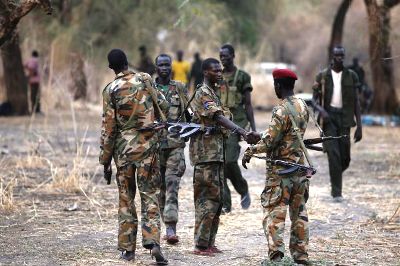Uganda fails to receive South Sudan rebel delegation in Kampala
July 21, 2014 (ADDIS ABABA) – South Sudanese rebels said their delegation has returned to the Ethiopian capital, Addis Ababa, after Ugandan authorities failed to receive them at Entebbe Airport in Kampala on Monday.

The purpose of what would have been the first visit to Uganda by the opposition faction was to make preparations for a face-to-face dialogue between the two principals per requests by the Ugandan leader.
The talks, rebels said, would take place in Addis Ababa “any time soon” under the auspices of the former Nigerian president, Olusegun Obasanjo.
However, the South Sudanese opposition group has revealed a surprising event in which their delegation which arrived in Kampala on Monday morning was not received at the airport, stayed the whole day in the airport until they decided to return to Addis Ababa in the evening.
“Our nine-member delegation led by the deputy chairman, General Alfred Ladu Gore, arrived at Entebbe Airport on Monday at 11am, morning. Unfortunately they were not received by Ugandan authorities. The officials stayed in the Airport the whole day until they decided to return to Addis Ababa in the evening,” Machar’s spokesperson, James Gatdet Dak, explained in a press release he issued on Monday evening.
He said the attitude demonstrated by the Ugandan leadership had clearly indicated president Museveni was not serious to dialogue with the leadership of the South Sudanese SPLM [in opposition] despite his personal initiative.
President Museveni since June, he said, had been asking for a direct meeting with Machar in which the former Nigerian president, Olusegun Obasanjo, also approached the rebel leader on 11 June, in Addis Ababa, asking him to accept the offer.
Dak said the event has raised questions whether president Museveni was serious in making the request.
“Maybe the Ugandan leadership had a different intention,” he said.
“Maybe they didn’t like the fact that the mission to Kampala was made known to the world through the media.”
He said Kampala used to mislead the IGAD member countries that it wanted to dialogue and that it was the leadership of the South Sudanese opposition group which rejected the offer.
REBELS STAND BY CALLS
The South Sudanese rebels had been calling for withdrawal of Ugandan forces as a prerequisite before a meeting with the Ugandan leader could take place.
However, the rebels on Sunday agreed to initiate the dialogue with Kampala, which they have been accusing of interfering in the internal affairs of South Sudan by fighting alongside the government.
Asked whether the rebel leader had dropped the calls for withdrawal of Ugandan troops and unconditionally accepted to meet president Museveni despite their continued presence in South Sudan, Machar’s spokesperson, Dak, explained that they had always maintained the calls to withdraw all foreign forces fighting alongside the government.
“Our leadership has always maintained the calls that Ugandan troops should withdraw from South Sudan. And if this was to be one of the first items of the agenda which the Ugandan leadership would want to tackle in a meeting, our leadership would welcome such a dialogue,” he explained.
He however added that the rebel group was encouraged by president Museveni’s recent remarks in which he admitted there was no coup, denouncing the coup attempt narrative in Juba as untrue.
“If Uganda sent its troops to South Sudan with a mission to save an elected president from purported coup makers, this is not the case now,” he added.
He pointed out that the Ugandan leader had shown encouraging good gesture during the recent IGAD regional summit in Addis Ababa when he dismissed president Kiir’s claims of alleged coup in Juba.
Dak further claimed there was neither a “trustworthy or legitimate president to risk defending” nor “coup makers to fight against” in South Sudan, saying Uganda should withdraw its support from Juba.
Machar spokesperson added that the Ugandan government unnecessarily “implicated itself in the coup attempt narrative” or “was at least deceived to buy the concocted story” despite the fact that it was the only country in the region which “unfortunately” decided to believe the “faked coup.”
“By requesting to meet with our leadership we thought President Museveni might want to know the whole truth about the origin of the 15 December crisis and hopefully decide to play a positive, neutral role to end the war,” Dak further stressed.
He said after admitting there was no coup, Uganda should have realised that president Kiir started the violence “urged by his dictatorial tendencies to silence his political opponents and reformists in the ruling SPLM party.”
He further argued that the rebels saw no reason for “Uganda to continue supporting the regime or fighting in defence of somebody who instigated the violence and massacred tens of thousands of his citizens who elected him into office.”
The rebels’ spokesman further lamented that the continued presence of Ugandan troops would further encourage president Kiir’s regime with the attitude of intransigence in the peace process.
Fighting erupted in mid-December last year when president Kiir allegedly ordered commander of the presidential guards unit, Gen Marial Cinuong, currently under US sanctions, to disarm Machar’s ethnic Nuer soldiers, sparking the violence.
President Kiir accused his main political rival and former deputy of allegedly attempting coup, a claim which did not receive support from the region and the international community, except Uganda until June.
Machar dismissed the accusation as a false claim and said it was used by the president to get rid of the reformists in the ruling party.
Tens of thousands have died and over 1.3 million people have been displaced either internally or to the neighbouring countries for the last seven months of the fighting, according to estimates by the United Nations.
IGAD-mediated peace talks, now on hold, are seen as the best chance to bring the two warring parties to a peace agreement and end the crisis.
(ST)
